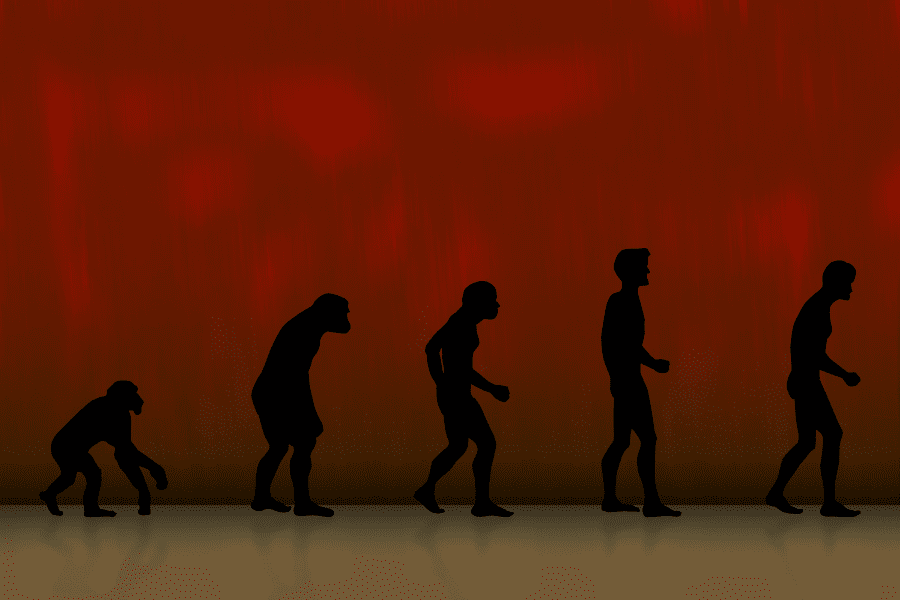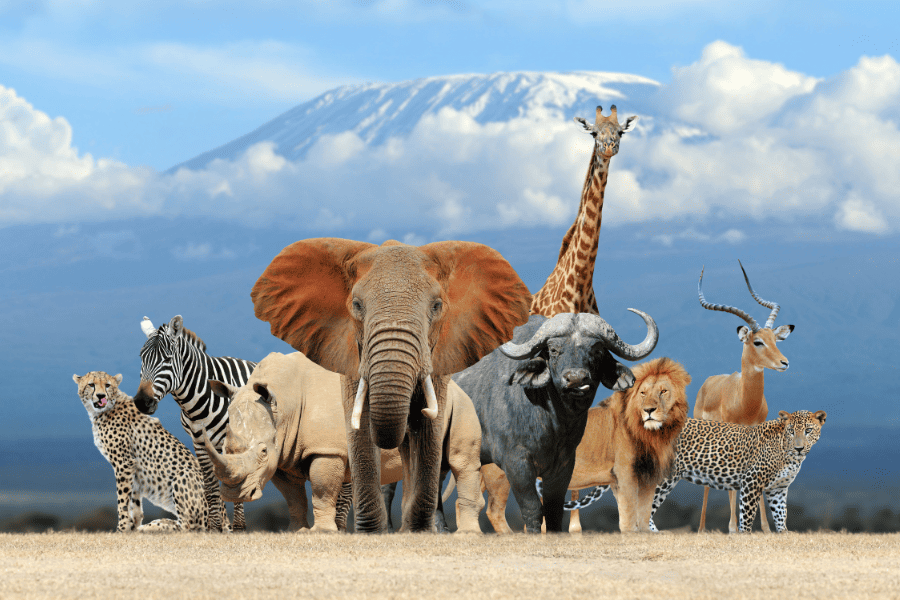Table of Contents
7. The Evolutionary Push in Human Development

The evolutionary journey of humans is marked by a distinct push towards developing intelligence and tool use, setting us apart from other species. This section explores how evolutionary pressures have uniquely shaped human development, driving us towards complex societies and technological innovations.
7.1 Survival of the Smartest
In human evolution, there has been a selective pressure towards increased intelligence. This is in contrast to many animals, where evolution might favor physical strength, speed, or camouflage. For humans, developing a larger brain and advanced cognitive abilities offered significant survival advantages. This is evident in early human history, where the ability to outthink predators, remember locations of food sources, or plan for harsh weather conditions was crucial for survival.
7.2 Tool Use and Development
The human evolutionary path has been heavily influenced by our use of tools. Unlike other animals that may use simple tools for basic tasks, humans have continually developed and refined tools and technology. From the earliest stone tools to modern computers, this ongoing evolution of tool-making has been a key driver of our development. It’s not just about the tools themselves, but about the cognitive abilities required to invent, improve, and use them effectively.
7.3 Social and Cultural Evolution
Alongside biological evolution, humans have undergone significant social and cultural evolution. Our ancestors who were better at communicating, cooperating, and living in larger groups had a survival advantage. These social skills have led to the development of complex social structures, languages, and cultures – aspects that are intricately linked to our evolutionary success.
7.4 Adaptation Through Learning
Humans have also evolved to be incredibly adaptable through learning. This ability to learn from experience, and especially to learn from each other, has been a significant evolutionary advantage. It means that humans can adapt to new challenges quickly, without waiting for generational genetic changes. This capacity for rapid adaptation is unique among animals and has allowed humans to thrive in a variety of environments and circumstances.
7.5 The Impact of Diet on Evolution
Our evolutionary path has also been influenced by changes in diet, such as the shift to cooking food. Cooking not only made food safer and more digestible but also allowed for more efficient nutrient absorption, which is thought to have supported brain growth. This dietary evolution, combined with the development of agriculture, has had a profound impact on human development and societal structures.
In conclusion, the evolutionary push in humans has been characterized by a focus on intelligence, tool use, social skills, adaptability, and dietary changes. These factors have collectively driven our species towards greater complexity in terms of technology, society, and culture, distinguishing our evolutionary journey from that of other animals.
8. Animals in Their Perfect World: An Evolutionary View

While humans have pursued a path of technological and societal advancement, it’s important to recognize that animals, in their own environments, are perfectly adapted to their worlds. This section explores how animals thrive without the need for complex technology or social structures, highlighting the diversity and sophistication of natural adaptations.
8.1 Perfect Adaptations to Environments
Animals exhibit a wide range of adaptations that perfectly suit their environments. For instance, fish have gills that allow them to extract oxygen from water, and birds have lightweight bones and feathers for flight. These adaptations are the result of millions of years of evolution, finely tuning each species to its ecological niche. Unlike humans, who alter their environment to suit their needs, most animals fit seamlessly into their environments as they are.
8.2 Instinctual Behaviors vs. Learned Behaviors
Animals primarily operate on instinct, a set of innate behaviors that are hardwired into their DNA. These instincts are perfectly suited to their survival needs. For example, sea turtles hatch on beaches and instinctively head towards the ocean, a remarkable feat of nature. In contrast, humans rely more on learned behaviors, which are developed through our extended learning period and cultural transmission.
8.3 Symbiotic Relationships and Ecological Balance
Many animals engage in symbiotic relationships, where different species live in close association for mutual benefit. This natural collaboration is crucial for maintaining ecological balance. For example, bees pollinate flowers while collecting nectar, benefiting both the plant and themselves. These relationships showcase a harmony in nature that does not require the complex societal structures seen in humans.
8.4 Natural Mastery of Skills
Animals are often masters of their skills without the need for formal education or tools. Beavers, for example, are adept at building dams, and spiders can create intricate webs. These skills are not learned but are innate abilities that each animal is born with. They demonstrate a level of expertise in their respective activities that is naturally developed.
8.5 The Role of Simplicity
There is a beauty and efficiency in the simplicity of animal lives. Without the complexities of technology or intricate social structures, animals live in a way that fulfills their needs and maintains ecological balance. This simplicity is something that humans often strive to return to, as seen in movements towards sustainability and harmony with nature.
In conclusion, animals in their natural environments exhibit a remarkable level of adaptation and expertise. Their lives, governed by instinctual behaviors, symbiotic relationships, natural skills, and simplicity, are perfectly suited to their needs and ecological niches. Understanding this helps us appreciate the diversity of life on Earth and the different ways in which species thrive without the need for human-like advancement.
Wrapping Up: Evolutionary Biology and Human Advancement

As we conclude our exploration of the eight key reasons why humans have advanced beyond animals, it’s important to reflect on the remarkable journey of our species. This journey is not just a tale of biological evolution, but also one of cultural, technological, and societal growth. At the same time, it’s crucial to appreciate the diversity and sophistication of life in the animal kingdom, each species perfectly adapted to its environment in its own way.
The Uniqueness of Human Advancement
Our exploration has taken us through various aspects of human uniqueness – from our complex brains, opposable thumbs, and language skills to our social collaboration, cultural transmission, extended learning periods, and environmental adaptations. These elements have collectively propelled human civilization to incredible heights, allowing us to build complex societies, create advanced technologies, and profoundly alter our environment.
Appreciating Animal Adaptations
Simultaneously, we’ve seen how animals, in their natural settings, are masterfully adapted to their environments. Their lives, guided by instinct and innate skills, form an essential part of the Earth’s biodiversity. The efficiency and simplicity of their existence, along with their ability to live in harmony with their surroundings, offer lessons in sustainability and balance.
A Harmonious Coexistence
This journey underscores the importance of respecting and protecting the natural world. As humans continue to advance, it’s vital that we do so with consideration for the other species that share our planet. Balancing our technological and societal growth with environmental stewardship is key to ensuring a harmonious coexistence with the animal kingdom.
Looking Towards the Future
As we look towards the future, it’s exciting to think about what further advancements humans will make. Yet, it’s equally important to remember that our actions have a significant impact on the planet and its inhabitants. Embracing our role as stewards of the Earth, learning from the simplicity and efficiency of animals, and continuing to grow in a sustainable and responsible manner will be critical in the years to come.
In conclusion, the journey of human advancement is a unique and ongoing story, filled with achievements and responsibilities. By understanding and respecting the natural world, and recognizing the value of both human innovation and animal adaptations, we can continue to progress in a way that honors the diversity and beauty of life on our planet.
Discover More
As we wrap up our journey through the hidden layers of the internet, it’s clear that the digital world is vast and full of mysteries. But the exploration doesn’t have to stop here! If you’re intrigued by the complexities of the internet, you might also enjoy delving into these related topics
Exploring Keyboard Layouts: A Journey Beyond QWERTY – ReViewMaster DEN (rvmden.com)


![Read more about the article Air Cooled CPU vs. Water Cooled CPU: Choose the right cooling system for PCs out of 2 [Part.2]](https://rvmden.com/wp-content/uploads/2024/01/Air-Cooled-CPU-vs-2-300x169.png)

